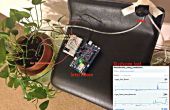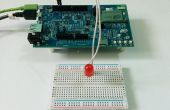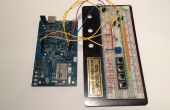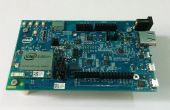Paso 2: Agregar secuencias de comandos de protocolo Kwikset
Ahora abre un documento nuevo y asígnele el nombre kwikset_protocol.py con el siguiente comando
#!/usr/bin/python# This is a library for providing access to Kwikset Smartcode Locks via UART # The h/w interface is 3.3V 9600 baud 8N1 standard UART # This is more of a protocol encoder/decoder though# You can find more information at randomwire.bizfrom binascii import hexlify,unhexlifypkt_count = 0NO_DATA = '' LOCK_CMD = 'e703' UNLOCK_CMD = 'e705' INIT_CMDS = ('e707','e74d','e702','e70a','e718','e709','e742','e70f') INIT_DATAS = ('','','','','','','01010101','15031301471205') PARSE_LOOKUP = {'e709':"parse_initack",'e727':"parse_lockstatus",'e729':"parse_newlockcode",'e742':"parse_error"}def generate_packet(cmd,data): global pkt_count pkt_count += 1 length = (len(cmd+data)/2)+2 base_pkt = "%0.2x%0.2x" % (length,pkt_count)+cmd+data pkt = "bd"+base_pkt+calculate_crc(base_pkt) return pktdef calculate_crc(pkt): crc = int("ff",16) #print "Starting crc = %0.2x"%crc while len(pkt)>1: crc ^= int(pkt[0:2],16) #print "After byte 0x%s, CRC = %0.2x, Len=%d"%(pkt[0:2],crc,len(pkt)) pkt = pkt[2:] return "%0.2x"%crcdef validate_crc(pkt): if calculate_crc(pkt) == '00': return True else: return Falsedef parse_packet(pkt): if pkt[0:2] != 'bd': print "Bad packet header" return False if not validate_crc(pkt[2:]): print "Bad packet CRC" return False if ((len(pkt)/2)-2) != int(pkt[2:4],16): print "Bad packet length" return False cmd = pkt[6:10] data = pkt[10:-2] print "Found cmd=%s & data=%s"%(cmd,data) if cmd in PARSE_LOOKUP: parse = globals()[PARSE_LOOKUP[cmd]] return parse(data) return Truedef parse_initack(data): if data == '64': return True else: return False def parse_lockstatus(data): code_used = int(data[2:4],16) status_bits = int(data[4:6],16) if status_bits & 0x80: cause = "Remote Control" elif status_bits & 0x40: cause = "Code %d Entered"%(code_used) elif status_bits & 0x20: cause = "Automatic Lock" else: cause = "Manual/Key" if status_bits & 0x02: lock_state = "Unlocked" elif status_bits & 0x01: lock_state = "Locked" else: lock_state = "Unknown" return (lock_state,cause) def parse_newlockcode(data): return datadef parse_error(data): return datadef generate_init_packet(num): return unhexlify(generate_packet(INIT_CMDS[num],INIT_DATAS[num]))def generate_lock_packet(): return unhexlify(generate_packet(LOCK_CMD,''))def generate_unlock_packet(): return unhexlify(generate_packet(UNLOCK_CMD,'')) En este caso he usado vi, pero siempre puede instalar y usar nano o cualquier otro editor de texto de su elección.
Este es el script que contendrá todos los comandos para la comunicación con su cerradura Kwikset sobre UART.
Pegue el código siguiente en el archivo, guarde el archivo y salga de su editor de texto.
vi kwikset.py













